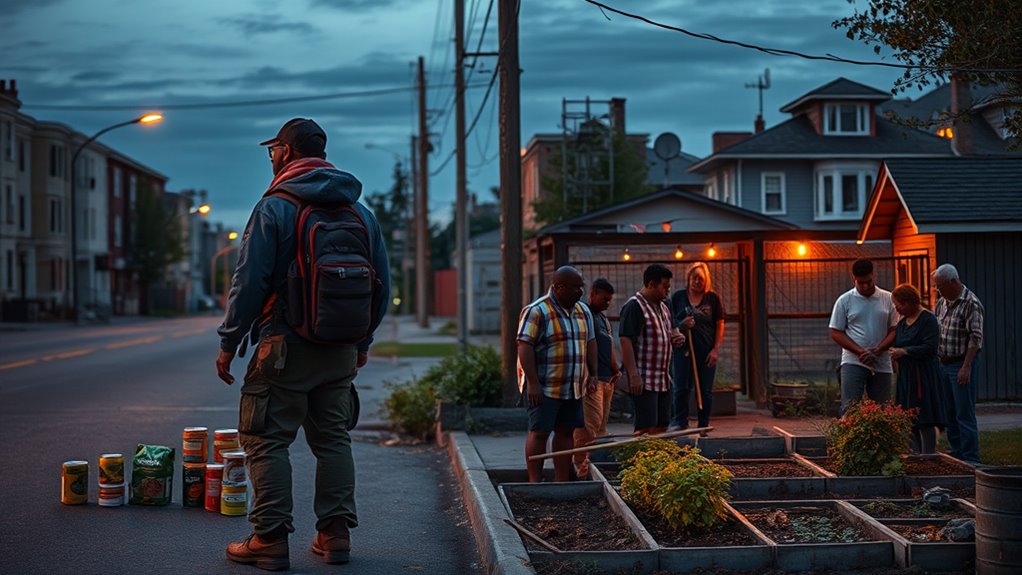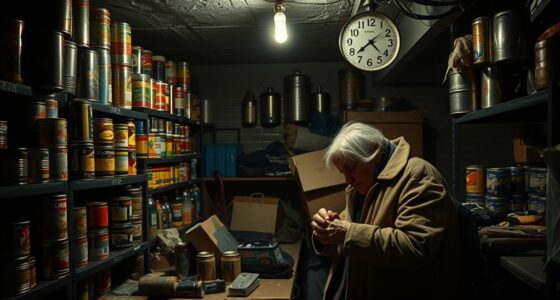Balancing your right to prepare with community needs involves thoughtful decisions about resource hoarding and sharing. While protecting yourself and loved ones is important, excessive stockpiling can cause shortages and unfairness. Ethical prepping encourages cooperation, mutual aid, and equitable resource distribution. By considering how your actions impact others, you can find a harmony that safeguards your safety without risking societal stability. If you want to explore how to navigate these moral nuances effectively, keep exploring the topic further.
Key Takeaways
- Balancing personal safety with community fairness raises ethical questions about resource hoarding versus sharing.
- Excessive stockpiling can cause shortages, highlighting conflicts between individual rights and collective needs.
- Ethical prepping involves considering how individual actions impact community resilience and equitable resource distribution.
- Sharing surplus supplies and participating in mutual aid promote solidarity and ethical responsibility.
- Preparing ethically requires aligning personal preparedness with societal well-being and avoiding behaviors that worsen inequalities.

Prepping, the act of preparing for emergencies and disasters, often raises ethical questions about how far individuals should go in stockpiling resources and planning for worst-case scenarios. When you decide to stockpile food, water, medical supplies, or other essentials, you’re engaging in a form of resource allocation that balances your personal responsibility with broader community considerations. You might ask yourself: is it right to amass supplies for yourself and your family when others may have little or nothing? This dilemma underscores the tension between individual rights and community needs, prompting you to consider how your actions impact others during crises.
Stockpiling supplies raises ethical questions about balancing personal responsibility and community needs during crises.
Resource allocation becomes a central issue in prepping ethics. If everyone stockpiled excessively, it could lead to shortages and unfair distribution, worsening the very problems you’re trying to prepare for. On the other hand, you have a personal responsibility to protect yourself and your loved ones, ensuring you’re not left vulnerable when disaster strikes. This personal responsibility drives many preppers to accumulate supplies, but it can also lead to questions about fairness. Are you justified in prioritizing your survival at the expense of those who might not have the means to do so? These questions don’t have easy answers, but they highlight the importance of considering the broader impact of your prepping activities.
You might also think about the community’s well-being when making decisions. Sharing resources, participating in local mutual aid groups, or contributing to community preparedness efforts can help bridge the gap between personal responsibility and collective good. Engaging in these actions demonstrates an ethical stance that values cooperation over individual hoarding. It’s about finding a balance: securing enough resources for your own safety while also respecting the needs of others. This balance isn’t always easy to achieve, especially when resources are limited or when societal inequalities come into play.
Ultimately, prepping ethically involves recognizing that your actions can influence others, both during and after a disaster. While it’s natural to want to protect yourself, consider how your preparedness might affect community resilience. Are you willing to share surplus supplies or assist neighbors? Do you support policies that promote equitable resource distribution? These choices reflect your commitment to ethical preparedness—where personal responsibility doesn’t overshadow the importance of community solidarity. Additionally, choosing the right home theatre projector can enhance your preparedness for entertainment and relaxation during stressful times, ensuring comfort and mental well-being. Striking this balance requires constant reflection and a willingness to adapt, ensuring that your preparations serve both your safety and the common good.
Frequently Asked Questions
How Do Preppers Prioritize Individual Rights Over Community Safety?
You prioritize personal autonomy by ensuring your individual rights are protected through self-sufficiency and secure resource allocation. You focus on maintaining control over your supplies and decisions, even in a crisis, to avoid reliance on others. While community safety is important, you believe safeguarding your personal rights helps you stay prepared and resilient. This approach allows you to act independently and responsibly without compromising your autonomy or resource security.
Can Prepping Lead to Social Division or Distrust?
Prepping can lead to social division or distrust if you engage in resource hoarding, making others feel insecure or excluded. When you stockpile supplies excessively, it fosters community suspicion, as neighbors may worry about fairness or access to shared resources. To prevent this, you should communicate openly and consider sharing or cooperating with your community. This approach builds trust and reduces the risk of social divisions caused by individual prepping efforts.
What Legal Issues Arise From Sharing Prepping Resources?
Imagine a scene from a dystopian novel where sharing resources is risky. You could face legal liabilities if you distribute prepping supplies without proper authorization. Laws around resource ownership and liability vary, making sharing tricky. You might unintentionally violate regulations or face lawsuits. Always understand your local laws to avoid legal issues, ensuring your prepping efforts stay within legal bounds and protect your rights and community.
How Do Cultural Differences Influence Prepping Ethics?
You should recognize that cultural norms heavily influence prepping ethics, shaping what you consider acceptable resource sharing or self-sufficiency. Ethical relativism suggests that these norms vary widely, so your approach might differ based on cultural values. This affects your decision-making, as what’s ethical in one community could be frowned upon in another. Respecting diverse perspectives helps you navigate these differences, promoting respectful and culturally sensitive prepping practices.
Is There a Moral Obligation to Help Others in Disaster Scenarios?
You might feel a moral obligation to help others during disaster scenarios, but self-sufficiency dilemmas often challenge this. While aiding others aligns with compassion and community values, prioritizing your safety and resources is essential. You’re not necessarily obligated, but many believe that helping strengthens community resilience. Ultimately, balancing your preparedness efforts with a willingness to assist others depends on your personal ethics and the specific circumstances you face.
Conclusion
Ultimately, balancing your individual rights with community needs is like tending a delicate garden—you must nurture your own plants while ensuring the entire landscape flourishes. Prepping isn’t just about personal safety; it’s about cultivating resilience that benefits everyone. By respecting others and sharing resources wisely, you become an essential part of a thriving ecosystem. Remember, a well-tended garden blooms brightest when every part works together, just like a community built on mutual care and responsibility.










